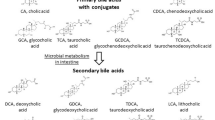Abstract
Bile acid composition was assessed in 50 patients with colorectal cancer as compared to that in a control group of 50 subjects. The two groups were age- and sex-matched. The overall bile acid values were similar in both groups, while the relative concentrations of primary and secondary bile acids were different, a significant increase in the patients with colorectal cancer being observed. This finding thus seems to confirm the existence of a link between colorectal cancer and cholelithiasis. Both conditions share common risk factors, such as alterations in cholesterol metabolism and bile acid composition.
Similar content being viewed by others
References
Goldbohm RA, Vanderbrandt PA, Van't Veer P, Dorant E, Sturmans F, Hernus RJ (1993) Cholecystectomy and colorectal cancer: evidence from a cohort study on diet and cancer. Int J Cancer 53:735–739
Nielsen GP, Theodors A, Tulinius H, Sigvaldason H (1991) Cholecystectomy and colorectal carcinoma: a total population historical prospective study. Am J Gastroenterol 86:1486–1490
Markman M (1982) Cholecystectomy and carcinoma of the colon. Lancet 1:47
Moorehead RJ, Kernohan RM, Patterson CC, McKelvey STD, Parks TG (1986) Does cholecystectomy predispose to colorectal cancer? A case control study. Dis Colon Rectum 29:36–38
Turnbull PRG, Smith AH, Isbister WH (1981) Cholecystectomy and cancer of the large bowel. Br J Surg 68:551–553
Blanco D, Ross RK, Paganini-Hill A, Henderson BE (1984) Cholecystectomy and colonic cancer. Dis Colon Rectum 27:290–292
Capron JP (1983) Cholelithiasis and colon cancer. Concours Med 105:1939–1950
Roslyn JJ, Kuchenbecker S, DenBesten L, Pitt HA, Polarek JW (1981) The differing effects of early and chronic cholelithiasis on hepatic bile lithogenicity. Am J Surg 141:34–39
Roda E, Aldini R, Mazzella G, Roda A, Sama C, Festi D, Barbara L (1978) Enterohepatic circulation of bile acids after cholecystectomy. Gut 19:640–649
Tocchi A, Ciani R, Cerroni M, Puma F, Brozzetti S, Antoni R, Maccioni AF (1983) Meaning of biliary lithiasic pathology in the etiopathogenesis of large intestine carcinoma. Chir Ital 35:898–910
Korpela JT, Adlercreutz H, Turunen MJ (1988) Fecal free and conjugated bile acids and neutral sterols in vegetarians, omnivores, and patients with colorectal cancer. Scand J Gastroenterol 23:277–283
Stadler J, Yeung KS, Furrer R, Marcon N, Himal HS, Bruce WR (1988) Proliferative activity of rectal mucosa and soluble fecal bile acids in patients with normal colons and in patients with colonic polyps or cancer. Cancer Lett 38:315–320
Owen RW, Henly PJ, Thompson MH, Hill MJ (1986) Steroids and cancer: faecal bile acid screening for early detection of cancer risk. J Steroid Biochem Mol Biol 24:391–394
Jørgensen T, Rafaelsen S (1992) Gallstones and colorectal cancer — there is a relationship, but it is hardly due to cholecystectomy. Dis Colon Rectum 35:24–28
Van der Linden W, Katzenstein B, Nakayama F (1983) The possible carcinogenic effect of cholecystectomy. No postoperative increase in the proportion of secondary bile acids. Cancer 52:1265–1268
Gafà M, Sarli L, Sansebastiano G, Lupi M, Longinotti E, Rigamonti PP, Peracchia A (1987) Gallstones and risk of colonic cancer: a matched case-control study. Int Surg 72:20–24
Hill MJ, Growther JS, Drasar BS, Hawksworth G, Aries V, Williams REO (1971) Bacteria and aetiology of cancer of large bowel. Lancet 1:95–100
Reddy BS, Weisburger JH, Wynder E (1975) Effects of high and low risk diets for colon carcinogenesis on fecal microflora and steroids in man. J Nutr 105:875–884
Castleden WM, Detchon P, Misso NLA (1989) Biliary bile acids in cholelithiasis and colon cancer. Gut 30:860–865
DeRubertis FR, Craven PA, Saito R (1984) Bile salt stimulation of colonic proliferation. Evidence for involvement of lipoxygenase products. J Clin Invest 74:1614–1624
Deschner EE, Raicht RF (1979) Influence of bile on kinetic behaviour of colonic epithelial cells of the rat. Digestion 19:322–327
Craven PA, Saito R, DeRubertis FR (1983) Role of local prostaglandins synthesis in the modulation of proliferative activity of rat colon epithelium. J Clin Invest 72:1365–1375
Alpers DH, Philpott GW (1975) Control of DNA synthesis in normal rabbit colonic mucosa. Gastroenterology 69:951–959
DeRubertis FR, Craven PA (1980) Early alterations in rat colonic mucosal cyclic nucleotide metabolism and protein kinase activity induced by 1,2-dimethylhydrazine. Cancer Res 40:4589–4598
Bruer NF, Dommes P, Jaekel S, Goebell H (1985) Fecal bile acid excretion pattern in colonic cancer patients. Dig Dis Sci 30:852–859
Morvay K, Szentléleki K, Török G, Pintér A, Börzsönyi M, Nawroth R (1989) Effect of change of fecal bile acid excretion achieved by operative procedures on 1,2-dimethylhydrazine-induced colon cancer in rats. Dis Colon Rectum 32:860–863
Roberton AM (1993) Roles of endogenous substances and bacteria in colorectal cancer. Mutat Res 290:71–80
Imray CH, Radley S, Davis A, Berker G, Hendrickse CW, Donovan IA, Lawson AM, Baker PR, Neoptolemos JP (1992) Faecal unconjugated bile acids in patients with colorectal cancer or polyps. Gut 33:1239–1245
Summerton J, Goeting N, Trotter GA, Taylor I (1985) Effect of deoxycholic acid on the tumour incidence, distribution, and receptor status of colorectal cancer in the rat model. Digestion 31:77–81
Summerton J, Flynn M, Cooke T, Taylor I (1983) Bile acid receptors in colorectal cancer. Br J Surg 70:549–551
Cheah PY, Bernstein H (1990) Modification of DNA by bile acids: a possible factor in the etiology of colon cancer. Cancer Lett 49:207–210
Ferguson L, Parry JM (1984) Mitotic aneuploidy as a possible mechanism for tumour promoting activity in bile acids. Carcinogenesis 5:447–451
Reddy BS, Sharma C, Simi B, Engle A, Laakso K, Puska P, Korpela R (1987) Metabolic epidemiology of colon cancer: effect of dietary fiber on fecal mutagens and bile acids in healthy subjects. Cancer Res 47:644–648
Author information
Authors and Affiliations
Rights and permissions
About this article
Cite this article
Tocchi, A., Basso, L., Costa, G. et al. Is there a causal connection between bile acids and colorectal cancer?. Surg Today 26, 101–104 (1996). https://doi.org/10.1007/BF00311772
Received:
Accepted:
Issue Date:
DOI: https://doi.org/10.1007/BF00311772




